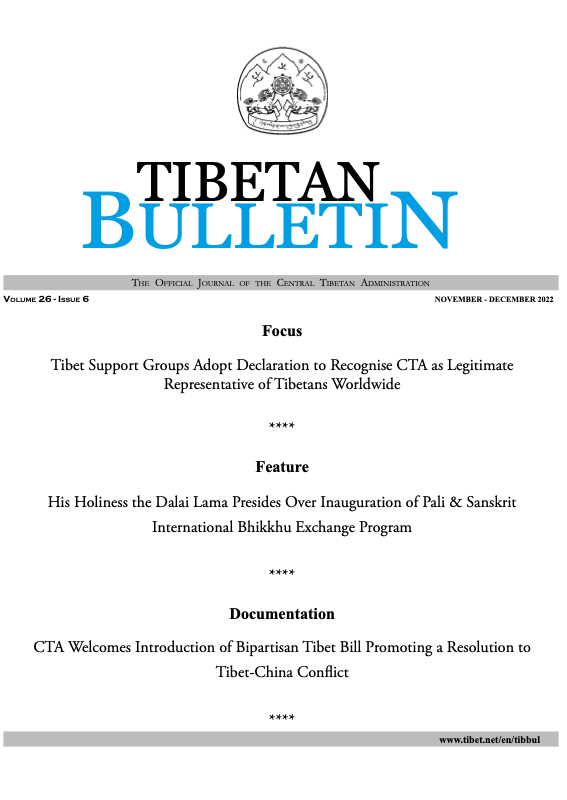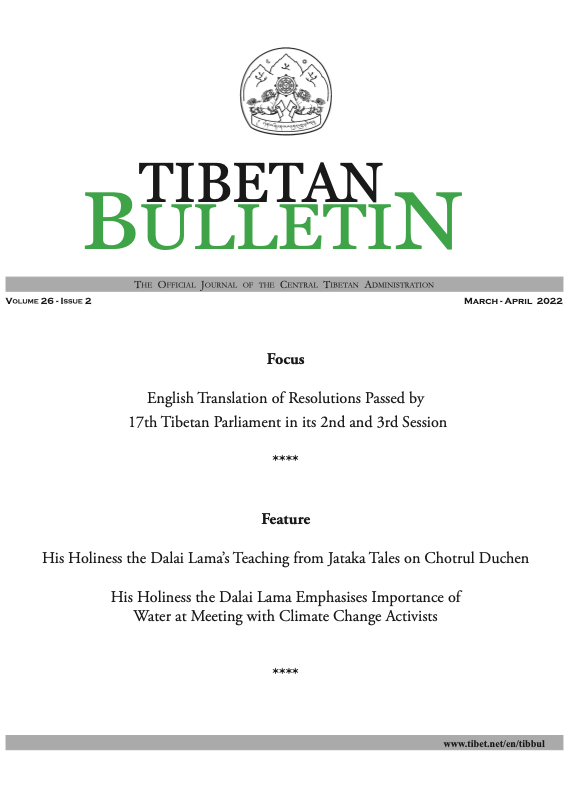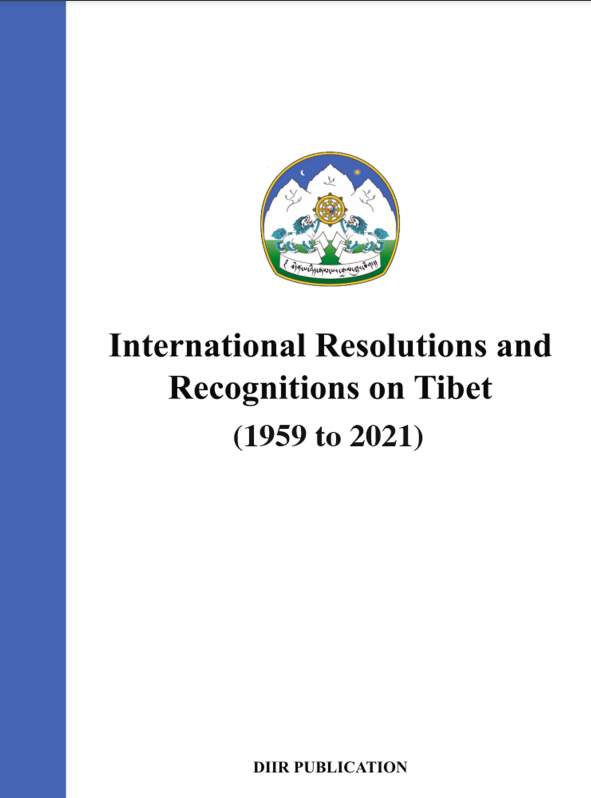Today, I have nothing new to tell you. I am very glad that except for one, all the other deputies are present here. Among the institutions of our exiled set up, we consider this parliament as one of the most important. From the Dalai Lama downwards, when everybody holds this body in esteem and honour and when members are not present in strength, then an impression may be formed that the members themselves are not serious about their responsibilities and underestimate its importance. Therefore today when you have gathered in good number, I am very happy. It shows that as per the esteem shown by others, you all have taken your responsibilities seriously. Thank you!
The purpose of meeting here is to evaluate what we have done so far and discuss the pros and cons and at the same time think seriously on what we can do in the future, and try our level best to come out with suggestions. This is important. Sometimes members may think that because the Dalai Lama is already there to lead, he will do the work
and they may bank on him and thinking that he would shoulder the responsibility, they may become lax. From my side, I may put my faith and hope in the Parliament thinking that it will come out with new ideas and directives and if between the two, there is an unbridged gap, there is a possibility of failure on our part and we may become lax. Therefore I ask everybody to do his/her best.
As everyone knows, we have come upon such a precarious time as this. On one hand, the situation inside Tibet is deteriorating from bad to worse. Some say that in some places the situation is almost like the days during the Cultural Revolution. But on the other, according to my view, the actions of the Chinese government seem to indicate a policy of desperation. It is not becoming of a great nation that can contribute a great deal to this world, which has a long history and in whom people can repose their faith. It seems to be the policy of a coward or a visionless person who thinks only of the moment and whiles away the time from day to day. Therefore, it is almost clear that the present policy cannot remain constant. The way the Chinese are acting in Tibet, not only in Tibet in their attitude towards Hong Kong and Taiwan as also on East Turkestan or Xinjiang is one of repression. In reality, this will not only not solve the existing problems but it will create more dissent in the minds of people and although it may bring about temporary peace and calm for one or two years, ultimately it will take generations and become a factor to escalate the problems. I firmly
believe that sooner or later a change will definitely take place. So from our side, there is no need to change our stand of Middle path. This is what I feel.
The overall conditions are such that one feels sad but, from another angle, there is certainly great hope. Therefore at such a delicate moment, I exhort all of you to think very seriously.
Personally I have always been telling you that the Tibetan cultural heritage of noble human behaviour, which is derived from the Buddhist philosophy, is of great importance. I would like to repeat it again today. Anybody can find ways and means to tackle their day to day tasks. Now, the basic aim of the Tibetan issue is so important that efforts to find ways and means to realise it cannot be confined only to political freedom. Our aim is not merely that we do not depend upon others in doing what we like. Our aim is to preserve a noble Tibetan tradition which has been ingrained in us for thousands of years, and today many impartial people in the world find it praiseworthy. This noble tradition is useful not only to us, but it can definitely benefit the whole world. In this world, in materially developed countries people are anxious to have mental peace, we have a means to provide peace in the form of our noble tradition. And if we can preserve this well, it will benefit not only the six million Tibetan people, the Tibetan environment, but millions of sentient beings in this Himalayan range and every human race as well as animals. However, if we are dependent on others as at present, and those on whom we are dependent look down upon Tibetan religion and culture with mockery and contempt and consider it useless, then it is impossible to preserve and promote that beneficial Tibetan tradition and philosophy. Under these circumstances, the minimum necessary requirement is a proper self-rule, and we have got to strive to achieve it.
Only yesterday I had a talk with an American whom I have known for a long time. He has had relations with Tibetan for about ten years and during these ten years, he said that the Tibetan nature seemed to have become degraded. People seem to be greedy for money and to get it, they tell lies or use force and trickery, etc., so that things seem to have become worse. Among Tibetans also some people have told me likewise. So this is important and vital. Yesterday I had talks with some new arrivals from Tibet as well as with the Tibetan Women’s Association. I told them that this thing which is of practical benefit to ourselves and of which we can be proud in the world, if it is lost, then our whole effort so far would come to naught. This noble tradition of great value which is beneficial for human society as also for individual families, if it is lost, then even if a time comes when Tibetans in and outside Tibet can be reunited, there will be no joy. After returning back, through pretence, deceit, envy and false show to one another if the society is made up of people who bully and suspect each other, it makes no difference whether we attain freedom or not. Although we will be free from the checks and controls of another nation but if it becomes a society where people’s minds are motivated by base jealousy there will be nothing to be happy about. So, although we cannot pass a resolution and decide here in the Parliament, but if we can hold this philosophy which is valuable and important in each member’s mind and thus think and speak when we are in session, and outside, in the Tibetan society during the twenty-four hours, months and years, if we can somehow introduce this attitude in every way, uphold it; and as our older generation passes away, it is important that we instil this in the minds of our younger generation and make it ingrained in them. Why did we set up separate Tibetan settlements in exile? Why did we set up separate Tibetan schools? There are certain small countries in this world who usually strive only for political freedom, but I have considered from the beginning that our struggle is different. Therefore, sometimes, we get carried away by the political freedom and are unable to think of how our society will evolve or what will happen to it after regaining it. Mere resolutions will not help at all. If we pass a resolution that everybody should become a compassionate Bodhisattva, it cannot come about. For this, every one -young and old have to make efforts so that it can be implanted in the minds of the people. Such thoughts should imbibe noble character in people. Otherwise merely passing resolutions on this will not help. In writing,
these things certainly appear proper and grand in form. But in reality, if these things go from bad to worse, if the nobility of character degenerates, then I feel that we shall have failed in our duty.
What can I do? I have no other means than talk about it with people. I feel that from all of you on the side of the administration as well as the Parliament, proper directives should be given to preserve our cultural traditions and nobility of character by every possible means in the community.
Now it is enough. You may be getting weary of my speaking on this always. But I consider this very important. If we have this in us, Tibetans will definitely have respect. In future, we can be proud of Tibet in the world and others will surely admire us. Otherwise, we cannot be an economic power. We have no sea route. Perhaps we can be rich by extracting the natural resources. But these are not very important. Therefore the traditional nobility of character must always be borne in mind. This, I feel, is very vital. On one hand, we say that we should accumulate good fortune. Good fortune can be accumulated if one has nobility, a good heart, an altruistic mind and leads a virtuous life. If one person tries, the individual fortune will increase. If a family strives, the family fortune will prosper. Adding them up, the fortunes of our society will increase. This is the same as performing puja (religious rituals) for internal good fortune. On the contrary, if the character of one’s body, speech and mind is so vile that it is bound to go downhill, and even then if one performs puja or recites the mani mantra, will there be any use? Very difficult.
Another point is about my Taiwan visit about which I had especially explained at the recent meeting. The Kashag can explain to you about it and the Chairman knows about the recent happenings. You were also there? (pointing to the Vice-Chairman) It is important that you should know about these matters. Otherwise, till now, we had placed the Taiwanese and Chinese in one category calling them the dual red-black Chinas but recently a big change has taken place. You should know about the necessity and the reasons as well as the long and short term purposes of this change. In our society also, some of the people have followed the directives of the government sincerely and remained steadfast. We have been talking about those who have been visiting Taiwan and being paid by them; it is possible for them to think that the Dalai Lama may be in the same category if they do not know the facts properly. Some guilty persons may interpret otherwise. They may justify their misdeeds by saying that the Dalai Lama is also visiting Taiwan. But it is not the same. How did I go to Taiwan? If people do not know about this, there is the danger that some may try to do strange and meaningless things in the society. So whether you deem it necessary to debate it in the Parliament or draw up a document and I think there is a clarification paper in the Kashag this matter should be properly understood in the community. So far, those people in our community who have remained steadfast, adhering to all the instructions of the government, have left a good record. Those people who till now have been flouting all the orders of the government and indulging in wrong things their record of misdeeds still remains and they have not been cleared. What was the purpose of my visit? It was to stop the misdeeds of these people forthwith. These activities do not benefit the government of Taiwan. For the people of Taiwan, it has caused disgrace and serves no useful purpose. A good impression of the Tibetan community will benefit the government and people of Taiwan. Otherwise what is the use if they are placed at par with the duo red-black Chinas? So in a situation where we could not explain things properly they thought it was a mistake, which they could not rectify at once or do anything about it. Thus we are now trying to find a new way. Although I cannot assure you of a hundred percent result, by following this course we will have no regrets. The main thing is that we are striving to improve our common interest. I thought that you should know this too.
As I said before, I came to the Parliament today not because I had something knew to tell you. According to the Charter, I have to come to the Parliament once a year. So I came to say, ‘I am here’. I have nothing more to say. Everyone must work hard. Thank you!
Note: His Holiness the Dalai Lama delivered the above speech extempore in Tibetan. This English translation is not issued by the Office of His Holiness the Dalai Lama, and any comparison, therefore, should not be made with the one in Tibetan. This is only for information of the visitors who can’t read Tibetan. In case of doubts, consider the original speech in Tibetan.





